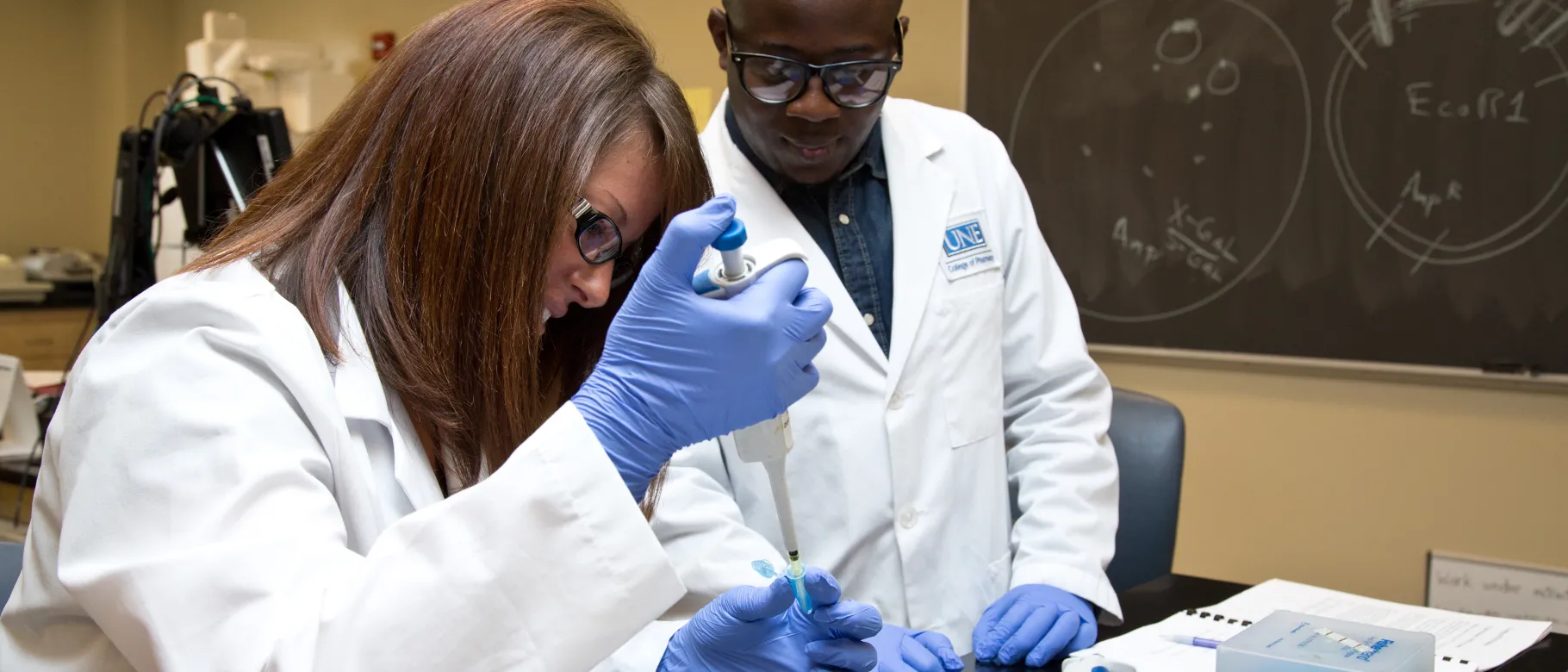UNE rises in rank to “High Research Activity” by Carnegie Classification

The University of New England has risen in the ranks of the nation’s research universities, according to the Carnegie Classification of Institutions of Higher Education in its recently released 2018 update. The classification system, widely regarded as the leading framework for categorizing accredited U.S. universities and colleges, ranked UNE, for the first time, in the category of “Doctoral Universities: High Research Activity.”
The reclassification puts UNE among 139 institutions with this status and places it as one of only ten institutions to advance from the “Master’s Colleges and Universities: Larger Programs” category to “Doctoral Universities: High Research Activity” status. In fact, UNE is the only institution in all of New England to rise from the former category to the latter.
The reclassification of UNE by Carnegie is a testament to our commitment to high-quality research as a key component of the institution." — President James Herbert
UNE President James Herbert, Ph.D., attributed the elevation in rank to the growth and increasing integration of research and scholarship at the university. “The reclassification of UNE by Carnegie is a testament to our commitment to high-quality research as a key component of the institution,” he said. “Our faculty members have done extraordinary work, often focusing their research on real-world problems that impact the region so that solutions can then be scaled to a larger, even global, level. And they have accomplished this, without exception, by deeply involving undergraduate students in their research.”
Dedication to “focused research and scholarship” is one of six priorities outlined by Herbert in his strategic plan for UNE. The document, published in November, notes that the university strives to make research and scholarship “an essential part of students’ educational experience.”
Associate Provost for Research and Scholarship Karen Houseknecht, Ph.D., said that while UNE offers a wide range of opportunities for research and scholarship at the graduate and professional level, as do many universities, it is the academic experience at the undergraduate level that most differentiates the university from many others. According to Houseknecht, 41 percent of UNE undergraduates participate in faculty research by the time they graduate.
Percentage of UNE Seniors who have worked with faculty on research projects, compared with 23% at all colleges surveyed by the NSSE.
“At UNE we strive to provide a diverse portfolio of enriching, scholarly experiences for our undergraduate students, who are hungry for hands-on research experiences,” she stated. “Whether they are serving as research assistants or conducting their own research or scholarship, our students are benefitting from faculty who view research mentorship as an integral part of their job – an essential and fundamental component of their mission as professors to cultivate the potential in these students, beginning the very first day they walk into the classroom.”
Whether they are serving as research assistants or conducting their own research or scholarship, our students are benefitting from faculty who view research mentorship as an integral part of their job..." — Associate Provost for Research Karen Houseknecht
To achieve the distinction of the “Doctoral Universities: High Research Activity” classification, a university must award a minimum of 20 research or scholarship doctoral degrees and invest at least $5 million in research expenditures per year.
“UNE attracted close to $19 million in external funding for research and scholarship in 2017,” shared Provost Joshua Hamilton, Ph.D. “That represents more than an 800 percent increase from a decade earlier.”
Percent increase in external funding for research and scholarship at UNE from 2007 to 2017.
“And importantly, virtually every research project at UNE directly involves students — whether graduate, professional or undergraduate students,” he added. “There is no doubt that UNE is deeply committed to research and scholarship as a fundamental component of our education and training programs, and the recognition by the Carnegie Classification is a powerful confirmation of that fact.”
There is no doubt that UNE is deeply committed to research and scholarship as a fundamental component of our education and training programs, and the recognition by the Carnegie Classification is a powerful confirmation of that fact.” — Provost Joshua Hamilton
Houseknecht noted that the change in Carnegie Classification is not surprising, given the dramatic rise in both the scope and impact of UNE’s research programs in recent years. The university currently has seven centers and institutes dedicated to interdisciplinary research in areas as diverse as pain and sensory function, North Atlantic/Arctic Studies, teaching and learning, and healthy aging. Robust research programs within the university’s graduate colleges, including the College Osteopathic Medicine, the College of Pharmacy, the College of Dental Medicine and the College of Graduate and Professional Studies complement undergraduate and graduate research stemming from both the College of Arts and Sciences and the Westbrook College of Health Professions.
The Carnegie Classification was developed by the Carnegie Commission on Higher Education in 1970 to support its program of research and policy analysis. Prior to the 2018 update, the classification was last revised in 2015.